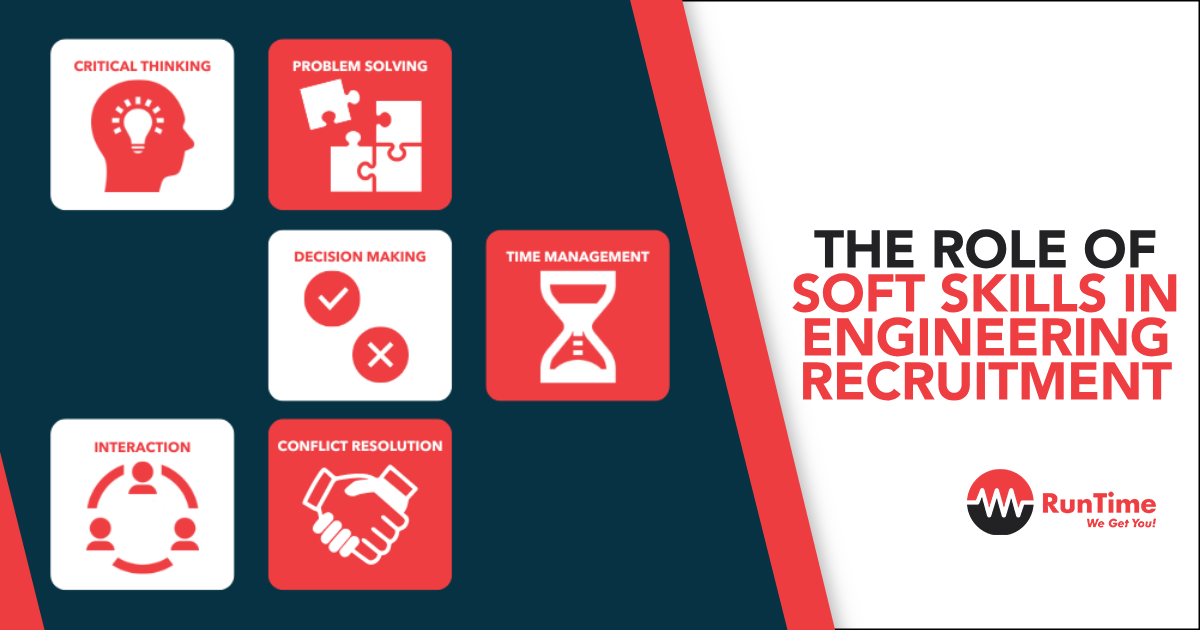In today’s competitive job market, the importance of soft skills in engineering recruitment cannot be overstated. While technical knowledge and expertise remain essential, it has become increasingly clear that soft skills play a vital role in the engineering field. Employers are now recognizing the value of these skills and are actively seeking candidates who possess both technical prowess and exceptional soft skills.
Soft skills complement technical skills by enabling engineers to communicate effectively, work collaboratively, and adapt to different situations. In an industry where teamwork, problem-solving, and innovation are paramount, soft skills can make the difference between a good engineer and a great one.
This blog will explore the role of soft skills in engineering recruitment, delving into why they are essential for professionals in this field and how they can be assessed and developed. By understanding the significance of soft skills, employers and candidates alike can ensure successful job placements and continued growth in the engineering industry.
Understanding Soft Skills
Before diving into the importance of soft skills in engineering, it is crucial to define what soft skills are. Soft skills, also known as interpersonal or people skills, are a set of abilities that enable individuals to interact effectively with others, manage their emotions, and navigate their environment. Unlike hard skills, which are job-specific and can be measured, soft skills are more intangible and harder to quantify.
Soft skills refer to a set of interpersonal, social, and communication abilities that enable individuals to effectively interact with others, navigate complex situations, and contribute positively to a team or work environment. In the context of the engineering field, these skills are gaining prominence due to several key reasons:
1. Collaborative Work Environments
Modern engineering projects are often highly complex and require collaboration among diverse teams. Engineers need to work together across various disciplines, cultures, and time zones. Soft skills such as communication, teamwork, and adaptability are crucial for fostering smooth collaboration, sharing ideas, and resolving conflicts.
2. Effective Project Management
Soft skills play a pivotal role in project management. Engineers are often required to communicate project goals, timelines, and progress updates to both technical and non-technical stakeholders. Strong communication skills ensure that everyone is on the same page, reducing the chances of misunderstandings and enhancing project efficiency.
3. Client and Stakeholder Interactions
Engineers frequently engage with clients, customers, and other stakeholders. The ability to communicate technical concepts in a clear and accessible manner is vital for building trust and maintaining successful working relationships. Soft skills like active listening and empathy help engineers understand client needs and tailor their solutions accordingly.
4. Innovation and Creativity
Soft skills contribute to fostering an environment of innovation. Engineers who excel in creativity and problem-solving can approach challenges from different angles and propose novel solutions. Effective communication skills enable them to share these ideas and collaborate on refining them with their peers.
5. Adaptation to Rapid Technological Changes
The engineering landscape is characterized by rapid technological advancements. Soft skills like a willingness to learn, adaptability, and critical thinking are essential for engineers to stay current with the latest developments and successfully integrate new technologies into their work.
6. Ethical Considerations
Soft skills also encompass ethical judgment and integrity. As engineering projects often have broader societal implications, engineers must be able to consider ethical and social factors when making decisions. Effective communication of ethical concerns is crucial within teams and when engaging with stakeholders.
7. Career Advancement
Soft skills contribute significantly to an engineer’s career progression. Engineers who can effectively communicate their ideas, work well in teams, and manage relationships are more likely to assume leadership roles, manage projects, and become mentors to junior colleagues.
Soft skills are essential in the engineering profession for several reasons. First, they allow engineers to work effectively in teams, promoting collaboration and innovation. Second, soft skills enable engineers to communicate with stakeholders, ensuring that project requirements are understood and met.
Finally, soft skills help engineers adapt to new challenges, keeping their skills relevant in a rapidly evolving industry. In summary, soft skills are integral to the success of engineering professionals and the companies they work for.
The Role of Soft Skills in Engineering Recruitment
As the engineering industry evolves, the demand for soft skills in technical recruitment is on the rise. Employers are increasingly recognizing the value of soft skills, realizing that they contribute significantly to a candidate’s potential for job success and long-term growth within a company.
Soft skills play a significant role in candidate selection, as they often differentiate candidates with similar technical qualifications. Candidates who demonstrate strong soft skills are more likely to excel in their roles, contribute positively to team dynamics, and effectively manage projects. In essence, hiring managers and recruiters are seeking well-rounded candidates who can not only meet the technical requirements of a position but also possess the interpersonal skills needed to thrive in a team environment.
The impact of soft skills on team dynamics and project management is undeniable. Engineers with excellent communication abilities can ensure that project requirements are clearly understood, reducing the risk of costly misunderstandings. Problem-solving skills enable engineers to address challenges effectively, leading to more successful projects.
Furthermore, the ability to work harmoniously with colleagues fosters a positive work environment, increasing job satisfaction, and reducing turnover rates.
In conclusion, the growing emphasis on soft skills in engineering recruitment highlights their importance in ensuring the success of both individual engineers and the companies they work for. By prioritizing soft skills in the recruitment process, employers can secure well-rounded candidates who are more likely to contribute positively to their organizations.
Identifying and Assessing Soft Skills in Candidates
Evaluating soft skills in engineering candidates can be challenging due to their intangible nature. However, employing specific strategies can help identify candidates with strong soft skills. Here are a few tips:
- Review resumes for evidence of soft skills, such as teamwork, leadership, and adaptability. Look for accomplishments and experiences that demonstrate these qualities.
- Pay attention to cover letters, as they can offer insight into a candidate’s communication style, attention to detail, and motivation.
- Consider incorporating pre-interview assignments that require candidates to demonstrate their problem-solving, time management, and creativity skills.
Behavioral interviews play a crucial role in assessing soft skills. By asking candidates to describe past experiences and explain how they handled specific situations, interviewers can gain valuable insights into their soft skills. Incorporating open-ended questions and hypothetical scenarios can also reveal how a candidate might approach challenges and collaborate with team members.
References and testimonials are essential tools in evaluating soft skills. Speaking with a candidate’s former colleagues, supervisors, and professors can provide a more comprehensive understanding of their interpersonal abilities and work styles.
Additionally, online reviews and testimonials on platforms like LinkedIn can offer further evidence of a candidate’s soft skills, showcasing their strengths from the perspective of those who have worked with them.
In summary, by utilizing various assessment methods and paying close attention to a candidate’s past experiences, employers and recruiters can effectively evaluate soft skills and make informed hiring decisions.
Developing and Enhancing Soft Skills in Engineering Professionals
Improving soft skills is an ongoing process, and engineers should actively seek opportunities to develop and refine these abilities. Here are some strategies for engineers to enhance their soft skills:
- Practice active listening and empathy when engaging with colleagues and clients. This will improve communication and strengthen relationships.
- Seek feedback from peers and supervisors, identifying areas for improvement and implementing necessary changes.
- Join professional organizations and attend networking events, honing interpersonal skills and expanding professional networks.
Continuous learning and professional development are crucial for soft skill enhancement. Engineers can enroll in courses, workshops, and seminars focused on communication, leadership, problem-solving, and other relevant soft skills. Additionally, pursuing certifications in project management or participating in mentorship programs can further strengthen these abilities.
Companies can play a vital role in supporting their employees’ soft skill development. By providing training programs, sponsoring professional development opportunities, and fostering a culture of continuous learning, organizations can help their engineering professionals grow and succeed. Furthermore, incorporating soft skill development into performance evaluations and promotion criteria can encourage employees to prioritize these abilities.
In conclusion, the development of soft skills is a critical aspect of engineering professionals’ growth and success. By investing in their employees’ soft skill enhancement, companies can ensure a talented and well-rounded workforce capable of tackling complex challenges and driving innovation.
Integrating Soft Skills into the Engineering Recruitment Process
Incorporating soft skills assessment into the engineering recruitment process is essential to identify well-rounded candidates. By following these steps, employers can effectively evaluate candidates’ soft skills:
- Include soft skill requirements in job postings, emphasizing their importance alongside technical qualifications.
- Develop interview questions that target specific soft skills, such as teamwork, communication, and problem-solving.
- Consider implementing group exercises or case studies during the interview process to observe candidates’ soft skills in action.
Adopting best practices for selecting candidates with well-rounded soft skills can lead to better hiring decisions and a more cohesive workforce. Some of these best practices include:
- Utilizing a standardized evaluation process that incorporates both hard and soft skills, ensuring a balanced assessment of candidates.
- Assembling a diverse hiring team that can provide different perspectives on candidates’ soft skills.
- Conducting thorough reference checks to gain insights into candidates’ interpersonal abilities and work styles.
Engineering recruitment agencies, such as RunTime Recruitment, play a vital role in identifying candidates with strong soft skills. With expertise in the engineering industry and a deep understanding of the importance of soft skills, these agencies can efficiently screen candidates and match them with suitable positions.
By partnering with a specialized recruitment agency, companies can streamline their hiring process and secure top engineering talent with the perfect balance of technical and soft skills.
Conclusion
Soft skills play a crucial role in engineering recruitment, as they significantly impact an individual’s job performance and their ability to contribute positively to a team. Hiring engineering professionals with strong soft skills can lead to improved teamwork, more effective project management, and ultimately, a more successful organization.
By prioritizing soft skills in the recruitment process, companies can ensure they are selecting well-rounded candidates capable of driving innovation and tackling complex challenges. Integrating soft skills assessment into the hiring process, adopting best practices for candidate selection, and partnering with specialized engineering recruitment agencies like RunTime Recruitment can significantly enhance a company’s ability to find the right talent.
With RunTime Recruitment’s expertise in engineering recruitment, you can be confident in our ability to match your company with candidates who possess the perfect balance of technical and soft skills. Our professional, knowledgeable, and supportive approach ensures prompt and efficient service, helping your organization secure top engineering talent for continued growth and success.









